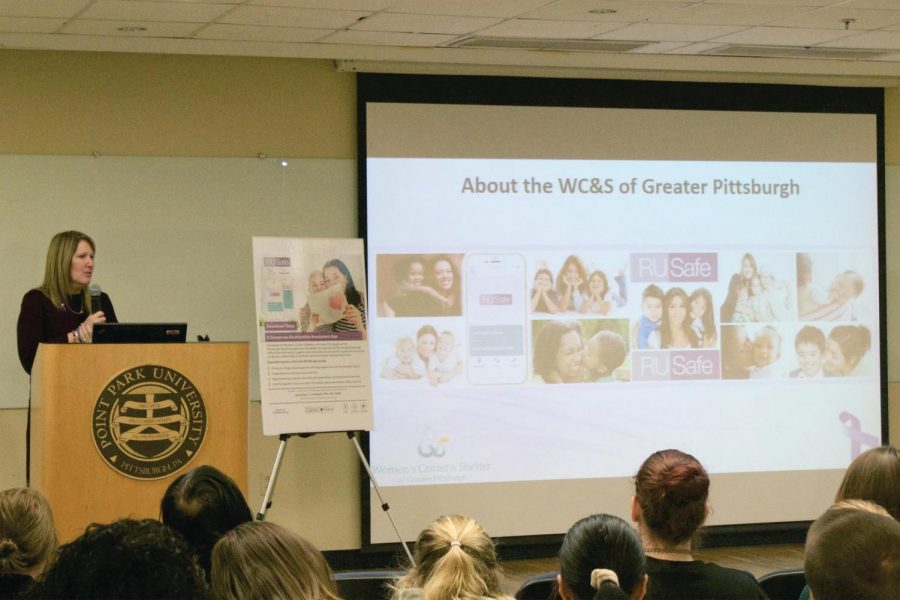‘Courageous Conversations’ covers domestic violence
Photo by Lauren Clouser
Kathleen Marecic discussed the RUSafe app at the Women’s Center and Shelter talk on Friday, October 19. in the JVH auditorium.
October 23, 2018
In the nearly full JVH auditorium, Ani Johnston, an outreach advocate for the Women’s Center and Shelter, asked everyone who had a birthday from April to August to stand up.
With nearly half the room standing, Johnston stated that number was comparable to how many college women experience abusive dating behaviors, which, according to the National Coalition Against Domestic Violence, is 43%.
In the middle of domestic violence awareness month, Point Park’s Department of Community Engagement teamed up with the YWCA and the Women’s Center and Shelter of Greater Pittsburgh to create “Courageous Conversations: Discussions on Domestic Violence.” The events featured a talk by the Women’s Center and Shelter and an installation of t-shirts created by students and members of the YWCA.
“Part of the mission of our department is to help create a space where people can have these conversations and either be inspired to help create change or be empowered to go out and do something or even just to be aware,” Heather Starr Fiedler, chair of the Department of Community Engagement said.
Point Park hosted Johnston and Kathleen Marecic, the Women’s Center and Shelter RUSafe Coordinator on Oct. 18, where they talked of signs of an abusive relationship, discussed their services and promoted the RUSafe app.
Melissa Barnhill, a graduate assistant and PhD student, helped organize the event. Barnhill teaches two sections of City University Life, and said the topic of her class’ service learning project was on women who were homeless due to domestic violence. Barnhill had her class attend the talk.
“After reaching out to the Women’s Center and Shelter of Greater Pittsburgh, they offered to come talk about their RUSafe App and had intended reaching out to college students to be RUSafe champions,” Barnhill said. “We were the first school they presented the app to.”
During the talk, Johnston said that it did not take physical violence for a relationship to become abusive. Johnston cited examples such as verbal, emotional and financial abuse, and stated that college students are the most likely to be in an abusive relationship.
“18 to 24 are the most commonly abused when you look at the ages,”
Johnston said.
Marecic discussed the features of the RUSafe app, which originally came out in 2014. The app was created by a company called Aspirant, and the Pittsburgh Women’s Center contributed the content, which included domestic violence hotlines across the U.S.
“There was not a general listing of all the hotlines across the US and so that was a lot of legwork to get the list put together. There’s nearly 1,600 hotlines across the United States,” Marecic said.
Marecic explained the app contains questionnaires for someone who believes they are in an abusive relationship, or for someone who believes a friend or family member is in an abusive relationship. There are links to different hotlines and there is also a journal feature that allows victims to have a record of incidents, which can be used as evidence in a court proceeding.
Barnhill said the talk helped to bring awareness to an issue that isn’t always talked about, but said the talk largely centered around heterosexual relationships and physical violence.
“I hoped the talk would have included all sexualities, not just heterosexual relationships and how the shelter accommodates the needs of the LGBTQ community,” Barnhill said. “Furthermore, I think discussing violence beyond the physical form could have helped students understand healthy vs. unhealthy behaviors in a relationship.”
Outside of the JVH presentation, there were t-shirts strung along clotheslines. The shirts were decorated by students and members of the YWCA, and displayed messages about domestic violence. According to Starr Fiedler, the installation was a part of the YWCA’s Clothesline Project, which they do annually during “A Week Without Violence” – a week centered around raising awareness for domestic violence.
“We partnered with them this year to bring that Clothesline Project here to campus in addition to what they were doing at the Y,” Starr Fielder said. “We rotated the t-shirts in the display throughout the week. And I think we had probably 50 or 60 t-shirts.”
The t-shirts were also on display on the second floor of Academic Hall by the elevators, typically a heavily trafficked area. Starr Fiedler said the founder of the Clothesline Project believed it was important for the t-shirts to have high visibility.
“It was started by someone who wanted to be able to have people have a physical outlet to share their story or their support, and then to be able to hang that where it can be visible and people could see it,” Starr Fiedler said.
Barnhill believed the series was important to today’s climate.
“Creating awareness around a stigmatized topic, I think is always important, especially in the era of #metoo,” Barnhill said.
“Discussions on Domestic Violence” is a part of “Courageous Conversations,” a monthly series put on by the Department of Community Engagement that centers around different issues.
“Throughout the year we’ll be doing more of these…” Starr Fiedler said. “We just really want to provide a space and an opportunity for students to learn and to have conversations about these important issues.”


















